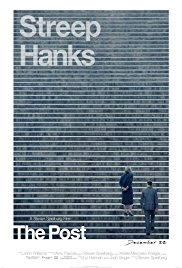The Post – 4/5 – Movie Reviews by Ry!
 The Post – 4/5 – Spielberg is a director that grabs the attention of any film fan. With work that spans decades, he has created everything from amazing adventure to poignant bio-pics. No matter the genre, Spielberg is a master of the craft. With this latest entry, he explores a true story about how a batch of documents changed news reporting. From amazing acting, strong direction and an ominous aspect of the truth, The Post is another amazing tale from an all-time great director.
The Post – 4/5 – Spielberg is a director that grabs the attention of any film fan. With work that spans decades, he has created everything from amazing adventure to poignant bio-pics. No matter the genre, Spielberg is a master of the craft. With this latest entry, he explores a true story about how a batch of documents changed news reporting. From amazing acting, strong direction and an ominous aspect of the truth, The Post is another amazing tale from an all-time great director.
Premise: One news agency battles the odds as they reveal 4 decades of coverups about the Vietnam War.
For a full list of actors/actresses, please refer to the film’s IMDb page. The acting in this ensemble cast is stupendous. Being based on true events, each actor/actress pulls out raw vigor to accentuate the era (1970) conflict (Vietnam War/Nixon Administration) and setting (Rise of The Washington Post). Being an ensemble cast, the focus is on interactive dynamic. Spielberg captures this essence of a ’day-to-day’ interaction by letting the people create believability through generalization. What I mean is that the characters ‘live’ as if they are part of a Newspaper, the gov’t or any aspect of this period piece. This allows raw expression, genuine conversations and realistic settings to strengthen the character as an individual. At the forefront is Tom Hanks and Meryl Streep. These two do a marvelous job in leading the way, commanding the screen through physical and emotional quips. You see their vigor is only matched by characterized situations. Their dialogue bridges casual settings with subtle emotions, creating situations of pure revelation and raw human reactions. This flows through the rest of the cast, as you believe (no matter the smallest role) they play a major part in everything happening in the film.
Based on a true story, Spielberg tackles this by using the ‘telling the story’ technique through character based revelations. By doing this, he methodically paces the true story aspect by layering the truth with an unpredictable eye. This allows the audience to live through the characters as they go about their business trying to report the news. As the prologue introduces us to the later years of the Vietnam War, we are introduced to the 1970s through the eyes of The Washington Post. Here, you get to see multiple characters as they navigate politics, social dynamics and company constraints as ‘documents’ about why we went to war are leaked to the press. This allows for the web of conspiracy to open the door in the first act. Here, the characters are left with different perspectives on how to decipher what is being revealed. A domino effect takes place, watching each piece fall and cause friction to two major news outlets (New York Times and The Washington Post). As we move into the second act, there is a race against all odds to get the truth out to the public. With a constraint on their hands, the script tightly maneuvers linearity through character perspective. This allow for human dynamic, quick interactions and ideal convictions to become the focus. The film moves at a snaps pace, never leaving loose ends and revealing only matters that are relevant. By exuding this ‘living’ approach, Spielberg showcases his strength as a director. He puts the eye on situations, characters and time to dictate the even flow of decisions and consequences. As the story unfolds, information is pieced methodically, allowing for all the reporting to come together in an organic way. This puts a light on the characters, showing their strengths, flaws and contentious values to the truth about the Vietnam War. This creates an atmosphere that foreshadows not only the news agencies’ legacies, but also the dire ramifications towards American society. Seeing this against the backdrop of the 1970s creates a down-to-earth approach to the obvious and predictable elements. As we move into the final act, the information revealed brings us to a climax that puts forth the themes, ideas and purpose of freedom of the press. Once we get to the epilogue, it is a full circle of everything that has come to light, showing the double sides of what we face as a people in today’s world.
The visuals are grounded by capturing the period piece. Being set in the 1970s, the buildings, homes, offices, attire and overall scope has the feeling of the era. Leaving everything in the background, it allows the characters to live that ‘everyday’ feeling, creating a situation believable for the audience. The score is basic for any dramatic/true story tale, not having a real effect on the overall enjoyment of the film.
The Post is a true event film that shows the strength of one director. This is an amazing film with strong characters and a riveting story. If you’re a fan of Spielberg or true event stories, this is one for you. It is worth the full price of admission.